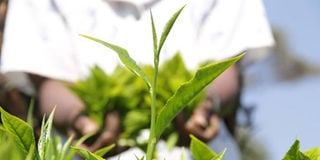Premium
Court halts split of KTDA factories amid farmers’ protests

Orthodox beverages that include white and purple teas are expensive because of the limited volumes produced in the country.
What you need to know:
- The case is part of a broader push by 17 KTDA satellite factories mainly in the West of Rift Valley, seeking independence from their parent companies
- KTDA currently manages 71 tea factories in 21 counties, with 54 operating as independent units and 17 as satellite units under larger factories
A dispute has erupted over the planned separation of accounts for four Kenya Tea Development Agency (KTDA)-managed factories in the South Rift, with small scale tea farmers moving to court to block the move.
Three farmers, Erick Tonui, Kiprono Langat and Anthony Kipyegon Ngetich, have petitioned the High Court in Bomet to stop the separation of Kapkoros Tea Factory PLC and its three satellite factories of Motigo, Tirgaga and Olenguruone.
The factories are located in Bomet and Nakuru counties.
In their case against Kapkoros Tea Factory PLC and KTDA Management Services Ltd, the farmers argue that the decision to split the accounts was made arbitrarily and goes against previous board resolutions suspending the move.
Court documents filed through lawyer Rogers Mugumya indicate that on January 9, 2024, the board resolved to fully separate the four factories and grant each full independence as a standalone entity.
“The respondents have blatantly disregarded board resolutions suspending the separation, arbitrarily proceeding to split the accounts, buying centers and farmers’ green leaf supply numbers,” the petitioners claim.
According to the board’s resolution, assets and liabilities would be allocated to ensure each factory operates independently with the decision justified as a move to improve operational efficiency and sustainability.
However, the farmers argue in court filings that the resolution ignored an earlier decision made by small scale tea growers who are shareholders in the companies to suspend the separation process.
“The resolution is against the decision in the meeting of January 3, 2024 that resolved to suspend the said separation and delineation of boundaries” the petitioners claimed.
The case has also exposed divisions among the factory directors.
Listed as directors and shareholders of the four factories are Simon Mutai, Kipkorir J Chepkwony, Leonard Cheruiyot Korir, David Kiptanui Korir, Kipngeno Rono and Dickson Kipyegon Kirui.
Others are Kapkoros Tea Factory PLC, Benard Kipkirui Koech and Robert Kipngeno Rono.
Out of the eight directors, Robert Kipngeno Rono, Kipkorir J Chepkwony, Kipngeno Rono, and Leonard Korir, oppose the separation.
During the 47th Annual General Meeting on December 14, 2023, at Olenguruone Tea Factory, shareholders resolved to suspend the separation until further notice.
Despite this, the respondents allegedly proceeded with the process separating accounts and green leaf supply numbers to the farmers’ detriment.
Letters protesting the move have reportedly been ignored by factory management.
High Court Judge Julius K Ng’arng’ar sitting in Bomet has issued temporary orders halting the separation until the case is heard and determined.
The case is part of a broader push by 17 KTDA satellite factories mainly in the West of Rift Valley, seeking independence from their parent companies.
KTDA currently manages 71 tea factories in 21 counties, with 54 operating as independent units and 17 as satellite units under larger factories.
Independence
The factories in the West of Rift zone covering Bomet, Kericho, Nyamira, Kisii, Nandi and parts of Nakuru and Narok are among those yet to gain full independence.
Farmers in the affected regions argue that separation will allow them to receive monthly payments directly from their respective factories rather than through a central account managed by the parent company.
Additionally, the move is expected to affect the second payment popularly known as the annual bonus, which is currently paid from a single account for all factories under a parent company.
The farmers want individual accounts to determine their payments based on market performance.
KTDA serves approximately 680,000 small-scale tea growers across the country who supply green leaf to its managed factories.





